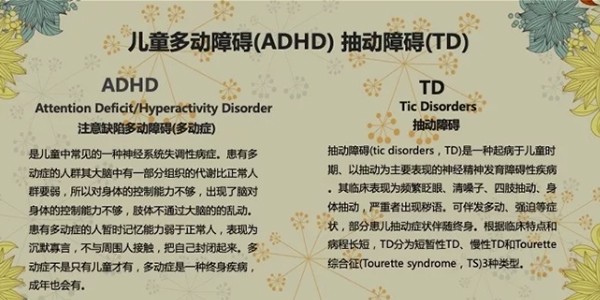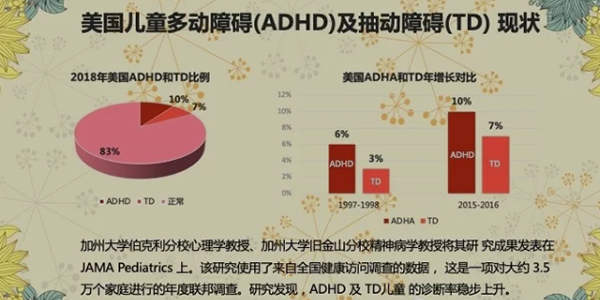









发布时间:2020年09月27日 来源:管理员
 立即收藏
立即收藏

What Is ADHD?
多动症是什么?
ADHD stands for attention deficit hyperactivity disorder. It is a medical condition. A person with ADHD has differences in brain development and brain activity that affect attention, the ability to sit still, and self-control. ADHD can affect a child at school, at home, and in friendships.
注意力缺陷多动障碍,常称“多动症”,是一种较为常见的疾病。多动症患者在大脑发育与活动方面较常人存在差异,这些差异会降低其专注能力、静坐能力与自控能力。多动症对患儿的影响渗透其生活的方方面面,包括学业、家庭与人际关系等。
What Are the Signs of ADHD?
多动症有什么症状?
All kids struggle at times to pay attention, listen and follow directions, sit still, or wait their turn. But for kids with ADHD, the struggles are harder and happen more often.
尽管儿童或多或少都会面临注意力不集中、听不进指挥、无法静坐或耐心等待等问题,但多动症患儿在上述问题的表现上更加明显、也更常受之困扰。
Kids with ADHD may have signs from one, two, or all three of these categories:
多动症患儿的症状常表现为以下三种:
Inattentive. Kids who are inattentive (easily distracted) have trouble focusing their attention, concentrating, and staying on task. They may not listen well to directions, may miss important details, and may not finish what they start. They may daydream or dawdle too much. They may seem absent-minded or forgetful, and lose track of their things.
注意力不集中。注意力不集中(极易分心),即指患儿无法长时间专注于当下的任务。具体表现如不按指挥行事、忽视重要细节、无法善始善终,亦或是长时间沉浸于幻想或经常性走神,以及总是心不在焉、丢三落四等。
Hyperactive. Kids who are hyperactive are fidgety, restless, and easily bored. They may have trouble sitting still, or staying quiet when needed. They may rush through things and make careless mistakes. They may climb, jump, or roughhouse when they shouldn't. Without meaning to, they may act in ways that disrupt others.
过度活跃。这一症状常表现为烦躁易怒、焦虑不安或对某事物极易丧失兴趣,在必要场合无法静坐,做事冲动毛躁、粗心大意,在不允许的情况下依然攀爬、跳跃或打闹,或是常常无意中打扰他人。
Impulsive. Kids who are impulsive act too quickly before thinking. They often interrupt, might push or grab, and find it hard to wait. They may do things without asking for permission, take things that aren't theirs, or act in ways that are risky. They may have emotional reactions that seem too intense for the situation.
做事冲动。这一症状具体表现为常常意气用事,做不到“三思而后行”。患儿常打断他人、争抢某物、缺乏耐心,自作主张,将他人物品占为己有,或冒险行事等,与此同时还可能伴有过激反应。
Sometimes parents and teachers notice signs of ADHD when a child is very young. But it's normal for little kids to be distractible, restless, impatient, or impulsive — these things don't always mean that a child has ADHD.
家长与老师可能在孩子很小的时候就发现了上述症状,但是对于幼儿而言,易分心、焦躁、冲动或缺乏耐心这些特征都是正常的,这些表现不一定意味着孩子患有多动症。
Attention, activity, and self-control develop little by little, as children grow. Kids learn these skills with help from parents and teachers. But some kids don't get much better at paying attention, settling down, listening, or waiting. When these things continue and begin to cause problems at school, home, and with friends, it may be ADHD.
一般而言,在儿童成长过程中,其注意力、行动力以及自控力在老师与家长的帮助指引下将逐渐增强。但是有些孩子在坐立听行等方面的进步并不明显,长此以往若对其日常生活与交际造成影响,就可能是患上了多动症。

How Is ADHD Diagnosed?
如何诊断多动症?
If you think your child has ADHD, make an appointment with your child's doctor.He or she will give your child a check-up, including vision and hearing, to be sure something else isn't causing the symptoms. The doctor can refer you to a child psychologist or psychiatrist if needed.
若您怀疑您的孩子患有多动症,请及时就医。医生会对孩子进行全面体检,包括视力与听力检查,以防其他病因导致孩子出现上述症状。必要时,医生会建议您将孩子送至心理医生或精神科医生处进行下一步治疗。
To diagnose ADHD, doctors start by asking about a child's health, behavior, and activity. They talk with parents and kids about the things they have noticed. Your doctor might ask you to complete checklists about your child's behavior, and might ask you to give your child's teacher a checklist too.
对于多动症的诊断,医生首先会询问孩子的健康状况、举止表现与行为活动,并且与家长和孩子确认具体的异常表现,此外医生可能会要求家长密切关注孩子的行为举止并进行记录,必要时学校与老师也应进行配合并记录。
After gathering this information, doctors diagnose ADHD if it's clear that:
在了解完必要信息后,医生将从以下几个标准诊断孩子是否患有多动症:
A child's distractibility, hyperactivity, or impulsivity go beyond what's usual for their age.
注意力不集中、过分活跃或冲动行事的发生频率明显高于其同龄人。
The behaviors have been going on since the child was young.
异常行为持续时间较长,一般从幼儿时期就已出现,并非偶然。
Distractibility, hyperactivity, and impulsivity affect the child at school and at home.
上述行为对孩子的日常学习与生活已造成不良影响。
A health check shows that another health or learning issue isn't causing the problems.
通过体检已排除其他健康因素与学习障碍的可能性。
Many kids with ADHD also have learning problems, oppositional and defiant behaviors, or mood and anxiety problems. Doctors usually treat these along with the ADHD.
许多患有多动症的孩子同时患有学习障碍问题,甚至出现反抗、叛逆行为,并伴有一定的情绪问题,例如焦虑不安,医生会根据孩子的具体情况同多动症一并治疗。
How Is ADHD Treated?
如何治疗多动症?
Treatment for ADHD usually includes:
治疗多动症通常采用以下几种方法:
Medicine. This activates the brain's ability to pay attention, slow down, and use more self-control.
药物疗法。通过药物对大脑的作用,使孩子集中注意力、减少鲁莽行事、增强自控力。
Behavior therapy. Therapists can help kids develop the social, emotional, and planning skills that are lagging with ADHD.
行为疗法。治疗专家将帮助患儿提升其社交能力、情感控制能力与规划能力。
Parent coaching. Through coaching, parents learn the best ways to respond to behavior difficulties that are part of ADHD.
家长配合。家长通过相关学习,从而能够科学正确地应对患儿的异常行为。
School support. Teachers can help kids with ADHD do well and enjoy school more.
学校支持。老师的帮助可使患儿更好、更快乐地融入校园生活。
The right treatment helps ADHD improve. Parents and teachers can teach younger kids to get better at managing their attention, behavior, and emotions. As they grow older, kids should learn to improve their own attention and self-control.
对症下药可有效改善多动症。父母和老师可以教会幼儿如何更好地管控自己的注意力,行为和情绪。随着年龄的增长,孩子们应该逐渐提高自身的注意力和自控力。
When ADHD is not treated, it can be hard for kids to succeed. This may lead to low self-esteem, depression, oppositional behavior, school failure, risk-taking behavior, or family conflict.
如果不及时采取治疗,孩子将很难健康成长,甚至影响未来的发展。严重者可能会导致自身自卑、抑郁、叛逆、学业失败、多冒险行为以及家庭冲突。
What Can Parents Do?
父母该如何帮助患儿康复?
If your child is diagnosed with ADHD:
如果您的孩子已确诊患有多动症:
Be involved. Learn all you can about ADHD. Follow the treatment your child's health care provider recommends. Keep all recommended appointments for therapy.
积极配合治疗。尽您所能去深入了解多动症。谨遵医嘱,保证孩子按时就医治疗。
Give medicines safely. If your child is taking ADHD medicine, always give it at the recommended time and dose. Keep medicines in a safe place.
谨遵医嘱用药。若您的孩子正在接受药物治疗,请保证其按时按量服药,且药物应放置于安全处,以免孩子误服。
Work with your child's school. Ask teachers if your child should have an IEP. Meet often with teachers to find out how your child is doing. Work together to help your child do well.
和学校沟通合作。鉴于实际情况,家长应与老师沟通孩子是否应接受个别化教育。若无需与正常学生隔离,家长应及时向老师了解孩子在校情况,共同努力使其尽早康复。
Parent with purpose and warmth. Learn what parenting approaches are best for a child with ADHD — and which can make ADHD worse. Talk openly and supportively about ADHD with your child. Focus on your child's strengths and positive qualities.
家长应坚定治疗信心,用爱与耐心陪伴孩子。学习多动症患儿最合适的教育方法,避免会使病情恶化的行为。坦诚地告知孩子多动症是什么,并且给予鼓励与支持。关注孩子的优点与积极品质,及时予以赞扬。
Connect with others for support and awareness. Join a support organizationfor ADHD to get updates on treatment and other information.
联系其他患者或家长,以获多方支持与信息。如加入多动症的相关救助组织,从而可获取最新的治疗与病情等相关信息。
What Causes ADHD?
多动症的成因有哪些?
It's not clear what causes the brain differences of ADHD. There's strong evidence that ADHD is mostly inherited. Many kids who have ADHD have a parent or relative with it.
目前导致多动症患者大脑差异的原因尚不清楚。但是有切实证据表明多动症主要受遗传因素影响。许多患儿的父母或亲戚就患有多动症。
ADHD is not caused by too much screen time, poor parenting, or eating too much sugar.
多动症并不是由接触电子产品时间过长、缺少父母陪伴或糖分摄入量过多导致的。
ADHD can improve when kids get treatment, eat healthy food, get enough sleep and exercise, and have supportive parents who know how to respond to ADHD.
当患儿接受治疗、饮食健康、睡眠充足、锻炼充分,且其父母给予孩子支持鼓励、科学应对,多动症便可得到改善。
点击查看原文
